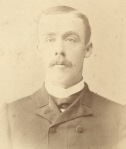I’ve spent the last few evenings browsing through J. M. McCaleb’s Once Traveled Roads (Nashville: Gospel Advocate Co., 1934).
John Moody McCaleb (1862–1953), from Hickman County, Tenn., entered College of the Bible in Lexington, Ky., in 1888. Among tales of how he met his wife and reminiscences of the faculty, which in those days included J. W. McGarvey, I. B. Grubbs, and others, Once Traveled Roads includes the following account of church life during McCaleb’s student days in Lexington:
When I entered school in 1888, there were two large congregations in Lexington—Main Street, and Broadway. They each contained about a thousand members. Robert T. Mathews was preaching for the Main Street church, and John S. Shouse for Broadway. There was no organ in either church. During my stay, however, Brother Mathews installed a small organ at Main Street, putting it near the center of the house, and on a level with the seats. Professor White called for a letter and put in his membership at Broadway. When Main Street built a new house and called it “Central,” they put in a great pipe organ that almost filled the end of the building. Not so long after I had left school in 1891, I heard that Broadway had also introduced the instrument [1902]. Main Street was getting the young people from Broadway. Something must be done. It was left to a vote, and the young people put the organ in. This time, Brother McGarvey and Brother Grubbs called for letters and put in their membership at Chestnut Street, a mission church that we students had established. But it was not many years till Chestnut Street also had the organ. Seeing the trend of things prompted me to write the five articles [in the Gospel Advocate] on “Pride, a Growing Evil.” Its growth was very manifest when I was there and became all the more so as time went on till both the churches and the school went to the world and minded earthly things. And is it not true that all our churches and schools are today in danger of the same fate? Will another generation or two find our schools and churches where Lexington now is? Let us hope not. (pp. 38-39)
I was thinking about that as I did some googling the other day when this turned up:
“I do not want to give the rest of the fellowship the idea that I am trying to promote instrumental praise anywhere else,” Atchley told the Chronicle. “What we are doing is a missional decision for our congregation, and while we are not trying to hide our decision, neither do we wish to flaunt it.”
In the Dec. 3 [2006] Bible study, Atchley told Richland Hills members that “there has never been a moment’s discussion of changing the name of this church or our affiliation with Churches of Christ.”
But he said Richland Hills must put the kingdom of God and Christ’s mission above concerns that the change might hurt the congregation’s standing or influence among Churches of Christ.
At the same time, he suggested to members that Richland Hills’ decision might “inspire many other Churches of Christ to be courageous in their kingdom efforts, and it could help stem the tide of gifted young leaders who are leaving.”
Plus ça change, plus c’est la même chose.
ADDENDUM (3/7/2015):
“A cappella is like Latin,” Graves said. “It is beautiful, it speaks to people at a certain level, but the problem is that a lot of people don’t speak Latin.
“What people in the Churches of Christ call instrumental music, other people just call music. It’s English.”
And in Music City, its appeal is undeniable. Graves said there’s no intention of alienating other congregations — only of better connecting to Nashville and Brentwood communities.
Otter Creek, where the congregation’s average age is 27, already has experimented with instrumental music with a Wednesday Vespers service; young adult, children’s ministry, and student ministry gatherings; and special worship for Good Friday, Christmas and other holidays.

